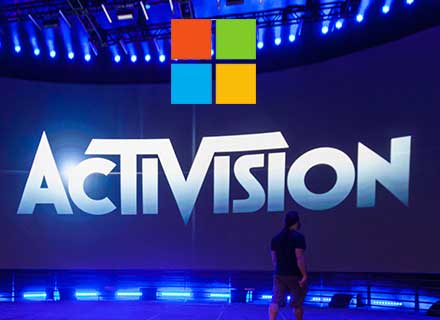A United States court provided the much-needed respite to the tech giant Microsoft by approving the latter’s acquisition of the USD 69 billion video game publisher Activision. The court order has now been seen as a setback for the Joe Biden government’s efforts of limiting the tech sector consolidation.
Understanding The Matter
Among the regulatory authorities, the European Commission was the first one to issue the green light to the USD 69 billion deal in May 2023. However, the Lina Khan-led US Federal Trade Commission (FTC), which has taken a stiff chance against the tech giant’s ‘monopoly’, challenged the pact by filing a lawsuit in a California court.
FTC feared that the deal would damage competition in the gaming industry.
The FTC previously accused Meta, Facebook’s parent company, of shutting off nascent competitors, apart from investigating whether Amazon ran afoul of antitrust laws. The US Department of Justice (DoJ) too had filed lawsuits against Google for alleged violation of antitrust laws.
FTC spokeswoman Victoria Graham also informed the media about Microsoft and Activision not providing assurances that they would not close the deal.
Talking about the USD 69 billion deal, has been projected as a crucial one for the USD 184 billion gaming industry.
“Microsoft earns billions of dollars each year in the video game business, but competitors like Nintendo and Sony — which makes the PlayStation console — have long been considered to have a better catalogue of games that attract players to their devices. Adding Activision and its slate of gaming studios to Microsoft’s Xbox consoles and its games subscription service could even the playing field,” stated a report from the New York Times.
Talking about FTC Chair Lina Khan, the 34-year-old legal scholar has made blocking corporate deals a key weapon to reign upon the tech biggies.
Her persistence resulted in semiconductor maker Nvidia and US defence contractor Lockheed Martin dropping their proposed deals. However, in 2022, the same weapon didn’t work against a deal involving Meta and fitness game maker ‘Within’. Now the Microsoft-Activision deal too clears the hurdle.
Following the US court verdict, the United Kingdom’s Competition and Markets Authority (CMA) is now looking to consider Microsoft’s proposals to resolve antitrust concerns in the European country.
Is There An ‘Exclusivity War’ Coming?
FTC’s prime concern about the USD 69 billion deal was that the pact would give Microsoft control over Activision games like Call of Duty, World of Warcraft, Diablo and the Candy Crush Saga, thereby restricting the use of these products on rival brands’ consoles.
Microsoft, has, however, agreed to license a 10-year contract with Nintendo, as per the reports. CEO Satya Nadella too clarified that his venture would have no incentive to restrict the use of Activision games on other consoles.
The deal, announced in January 2022, will give Microsoft ownership right over Activision’s line-up of games and utilize the products on Xbox platforms. Activision shares went up by about 5.6% after the US verdict. However, there are unanswered questions lying ahead.
In its 277-page report in 2022, the UK Competition and Markets Authority (UK CMA) found out that if ‘Call of Duty’ were no longer available on Sony’s PlayStation, people would simply switch to another console that offered the game.
“A step like this will obviously hurt Sony’s ability to continue investing in games and hardware. In fact, Microsoft has acquired a lot of gaming studios like Mojang and ZeniMax over the years. And in all its past acquisitions, it played one card quite consistently. Exclusively releasing new versions of games. And Microsoft could do the same with CoD too,” stated Finshots, which decoded the report’s findings.
Yes, Microsoft can make CoD’s new versions, make them exclusively available on Xbox, apart from selling sell more ‘Game Pass Subscriptions’, where gamers will have unlimited access to Microsoft’s gaming library, and in that process, controlling the gamers’ choices, in terms of picking up the consoles.
In 2001, when Sony acquired ‘Naughty Dog’ in 2001, the latter reportedly did not have an extensive portfolio of games. Despite the studio’s ‘The Last of Us’ being one of the all-time popular games (so much so that it became a web series in 2022), only 37 million copies of it have been sold so far. On the other hand, Activision’s CoD series’ copy sales figure has been at 400 million.
If Microsoft makes CoD an exclusive title, it will lead to a situation where the latter will be confined to only one console option in the form of Xbox, and this won’t spell well for the gaming industry.
Microsoft acquired another video game publisher ‘Bethesda’ in 2021. Since then, if someone wants to play Bethesda’s ‘Starfield’, he/she will have to own an Xbox. The tech giant may repeat the same formula with the Activision games.
Sony PlayStation, in response, may expand its library of ‘Exclusive Games’, thus resulting in a rat race between two of the industry giants, stagnating the sector growth between them and in the long run, making the gaming arena a less lucrative one, due to a lack of competition.
So, you have a ‘higher prices, fewer choices, and a less industry innovation’ kind of situation, as, to offset the cost factor in the Activision deal, Xbox may increase its subscriptions or remove deals like USD 1 trial of ‘Xbox Game Pass Ultimate’.
The Road Ahead
As per the reports, Microsoft may make Call of Duty available on all consoles. However, the UK CMA wants options like Microsoft spinning Activision off as a separate entity, when the concerned parties come to the negotiation table.
Ultimately, an industry’s progress depends on its competitiveness quotient. The more open and competitive it is, the more innovation and revenue stream it will drive.
Like any other business, Microsoft is entitled to keep itself profitable through mergers and acquisitions. However, it should not lead to an unhealthy ‘Xbox vs PlayStation’ exclusivity rivalry.

